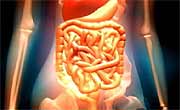Gut microbiomes of seropositive subjects differ from those of autoantibody-free first-degree relatives
FRIDAY, June 26, 2015 (HealthDay News) — Individuals with islet autoimmunity have alterations in intestinal microbiota, according to a study published online June 19 in Diabetes.
Aimon K. Alkanani, from the University of Colorado Denver in Aurora, and colleagues conducted high-throughput sequencing of bacterial 16S rRNA genes in subjects with islet autoimmunity living in the United States.
The researchers found that after adjustment for gender, age, autoantibody presence, and human leukocyte antigen, gut microbiomes of seropositive individuals were different from those of autoantibody-free first-degree relatives (FDRs) with respect to the abundance of four taxa. Compared with healthy controls with no family history of autoimmunity, subjects with autoantibodies, seronegative FDRs, and new-onset type 1 diabetes patients had different levels of the Firmicutes genera Lactobacillus and Staphylococcus. In seropositive subjects with multiple versus one autoantibody there were trends toward increased and reduced abundances of the Bacteroidetes genera Bacteroides and Prevotella, respectively. The gut microbiomes of autoantibody positive individuals and seronegative FDRs clustered together, but were distinct from those of new-onset patients and healthy negative controls. In seropositive versus seronegative FDRs there were no differences in biodiversity.
“Our data raise the hypothesis that alterations in the structural composition of the intestinal microbiota are associated with type 1 diabetes progression,” the authors write. “Identifying bacteria and immune pathways associated with early diabetes may lead to a new class of immunotherapies to modulate the gut microbiota and prevent islet destruction.”
Copyright © 2015 HealthDay. All rights reserved.








